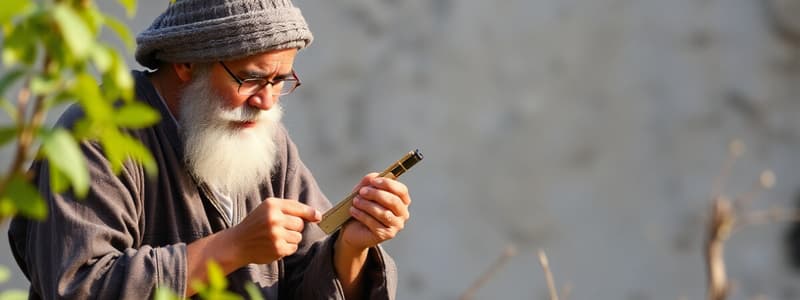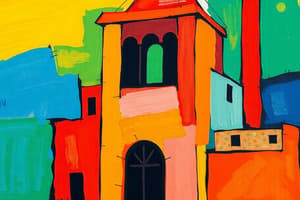Podcast
Questions and Answers
What does knowledge refer to in the context of the European Qualifications Framework?
What does knowledge refer to in the context of the European Qualifications Framework?
- The ability to solve complex problems in various fields
- Proven ability to use skills in different work situations
- Understanding personal and social abilities in tasks
- The body of facts, principles, theories, and practices related to a field (correct)
Which of the following best describes the definition of skills?
Which of the following best describes the definition of skills?
- The proven ability to collaborate with others in a learning environment
- The capacity to acquire theoretical knowledge through study
- The ability to complete tasks using personal traits and attitudes
- The ability to apply knowledge and use know-how in practical situations (correct)
In heritage conservation, which of the following is an example of cognitive skills?
In heritage conservation, which of the following is an example of cognitive skills?
- Recognizing various architectural styles
- Cleaning delicate frescoes without damaging them
- Using 3D scanners to document a site
- Determining intervention techniques for unstable buildings (correct)
What is a key emphasis of the definition of competences in the EQF?
What is a key emphasis of the definition of competences in the EQF?
Which of the following statements about practical skills is true in the context of heritage conservation?
Which of the following statements about practical skills is true in the context of heritage conservation?
Which of these is an example of knowledge application in heritage conservation?
Which of these is an example of knowledge application in heritage conservation?
Which type of skills involve the use of logical and creative thinking?
Which type of skills involve the use of logical and creative thinking?
In the EQF, the distinction between competences and skills is primarily based on what aspect?
In the EQF, the distinction between competences and skills is primarily based on what aspect?
What distinguishes competences from knowledge and skills in heritage conservation?
What distinguishes competences from knowledge and skills in heritage conservation?
Which of the following best describes the role of a restorer with strong competences?
Which of the following best describes the role of a restorer with strong competences?
Which competence is essential for sustainable management in cultural heritage?
Which competence is essential for sustainable management in cultural heritage?
What is a key characteristic of competences as compared to skills?
What is a key characteristic of competences as compared to skills?
Which of the following is NOT listed as a useful competence for contemporary restorers?
Which of the following is NOT listed as a useful competence for contemporary restorers?
What role does mapping and analysis of users' needs play in heritage conservation?
What role does mapping and analysis of users' needs play in heritage conservation?
Why is the application of new technologies important in heritage conservation?
Why is the application of new technologies important in heritage conservation?
Which statement best captures the importance of ethical guidelines in heritage conservation?
Which statement best captures the importance of ethical guidelines in heritage conservation?
Flashcards
Competences
Competences
The ability to apply knowledge and skills effectively in real-world situations, especially under conditions requiring responsibility and autonomy.
Knowledge
Knowledge
Knowing what something is or how it works.
Skills
Skills
The abilities you have to do something, typically acquired through practice or training.
Conservation Project Management Competence
Conservation Project Management Competence
Signup and view all the flashcards
Digital Competence in Heritage Conservation
Digital Competence in Heritage Conservation
Signup and view all the flashcards
User Needs and Requirements Mapping
User Needs and Requirements Mapping
Signup and view all the flashcards
Environmental Competence in Heritage Conservation
Environmental Competence in Heritage Conservation
Signup and view all the flashcards
Sustainable Management of Cultural Heritage Competence
Sustainable Management of Cultural Heritage Competence
Signup and view all the flashcards
European Qualifications Framework (EQF)
European Qualifications Framework (EQF)
Signup and view all the flashcards
Knowledge in Heritage Conservation
Knowledge in Heritage Conservation
Signup and view all the flashcards
Skills in Heritage Conservation
Skills in Heritage Conservation
Signup and view all the flashcards
Competence in Heritage Conservation
Competence in Heritage Conservation
Signup and view all the flashcards
Specific Example of Knowledge in Heritage Conservation
Specific Example of Knowledge in Heritage Conservation
Signup and view all the flashcards
Study Notes
Competences, Skills, and Knowledge
- Knowledge is described as facts, principles, theories, and practices, either theoretical or factual.
- Knowledge in heritage conservation includes historical construction techniques, architectural styles, and material properties.
- Restorers need theoretical knowledge of materials' reactions and factual knowledge of site-specific materials.
- Skills are the ability to apply knowledge and use know-how to complete tasks.
- Skills are categorized as cognitive (logical, intuitive, creative) or practical (manual dexterity, using tools).
- Practical heritage conservation skills include cleaning frescoes, using 3D scanners to document sites, and problem solving in conservation.
- Competences are the proven ability to use knowledge, skills, and personal/social/methodological abilities.
- Competences in conservation include managing projects, leading teams, and making responsible decisions.
Key Differences
- Knowledge is what you know.
- Skills are what you can do.
- Competences are how you effectively use knowledge and skills in different situations.
Level of Autonomy
- Competences require a higher level of autonomy and integration of knowledge and skills compared to skills alone.
Example in Context
- A heritage professional may know the importance of lime mortar (knowledge), demonstrate the technique (skills), and responsibly lead a team to apply the restoration techniques while considering environmental and cultural implications (competences).
Useful Competences for Contemporary Restorers
- Taking care of cultural heritage materials
- Achieving environmental challenges and objectives
- Sustainable management of cultural heritage
- Organization and logistics of complex situations
- Application of new technologies
- Digitalization
- Social media
- Developing knowledge banks on CH materials, techniques, and know-how
- Encouraging and supporting the development of networks
- Training and educational activities
- Implementing measures for people to practice heritage
- Encouraging creative industries in CH domains
- Mapping and analysis of user needs and requirements
Studying That Suits You
Use AI to generate personalized quizzes and flashcards to suit your learning preferences.



